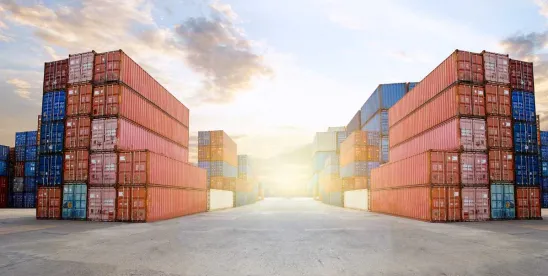Recent Developments
Biden signs into law 10-year statute of limitations for sanctions violations, possible TikTok ban, and other national security measures.
H.R. 815 makes emergency supplemental appropriations for Ukraine, Israel, and Indo-Pacific security, and includes significant provisions regarding sanctions and other national security matters. Such measures include (1) expansion of the statute of limitations for sanctions violations from five to 10 years; (2) a ban of TikTok if it does not undergo a divesture, and empowerment of the President to target other China-controlled applications; (3) prohibition on data brokers supplying certain personal data to China; and (4) authorization for the President to confiscate frozen sovereign Russian assets for use in Ukraine recovery.
Biden proposes increased tariffs on Chinese steel.
President Biden announced his intention to triple tariffs on imports of all Chinese steel and aluminum if an ongoing investigation confirms the existence of unfair market-distorting interventions by the Chinese government. Expectations are an increase from a current across-the-board tariff of 7.5 percent to a new level of 25 percent. The President also directed his officials to work closely with Mexico to ensure that Chinese products do not evade these tariffs by shipping through Mexico, and recently sent a team of senior officials to Mexico to discuss the situation.
U.S. government issues regulatory actions implementing AUKUS.
The U.S. Department of Commerce (“Commerce”) and the U.S. Department of State (“State”) respectively took steps towards easing export controls to implement the trilateral AUKUS security pact, which provides for enhanced security cooperation and defense trade among Australia, the United Kingdom, and the United States. Commerce amended the Export Administration Regulations (“EAR”) to ease controls over dual-use items, while State issued a proposed rule outlining an exemption under the International Traffic in Arms Regulations (“ITAR”) that it would issue in the event that it certifies that Australia and the United Kingdom have instituted export control regimes comparable to the United States, which would be the linchpin of AUKUS implementation. Read our analysis here.
U.S. initiates investigation into the practices of Chinese shipbuilders.
The United States Trade Representative (“USTR”) has begun a Section 301 investigation into “acts, policies, and practices of the People’s Republic of China (PRC) targeting the maritime, logistics, and shipbuilding sectors for dominance.” The USTR is seeking public comments on the investigation by May 22, and has scheduled a public hearing for May 29.
Forced labor audits questioned.
Members of the Congressional-Executive Commission on China called into question the reliability of audits used to establish that supply chains comply with the Uyghur Forced Labor Prevent Act (UFLPA). In a public hearing, members and witnesses argued that the actions of the Chinese government had restricted the ability of auditors to obtain the information necessary for their work. While the hearing itself does not have any direct legal impact on the ability of importers to certify that their imports comply with UFPLA requirements, companies with potential exposure in this area may wish to closely monitor developments in the United States and elsewhere.
French President Macron meets with Chinese President Xi in Paris.
The two leaders discussed trade, the war in Ukraine, and China’s relationship with Russia. President Macron called for “fair rules” in EU-China trade and welcomed China’s promise not to sell dual-use goods to Russia, while President Xi stated that the EU and China should “remain partners” and claimed that China has played a “positive role” in Ukraine.
United States and Mexico partner to expand the semiconductor industry.
State announced plans to work together with Mexico to develop the semiconductor industry and related supply chain. The initial phase will involve an assessment of Mexico’s present industry, regulatory framework, workforce, and infrastructure needs, with the goal of identifying future joint initiatives to strengthen and grow the sector.
Japanese companies increase involvement in U.S. market.
As Japan continues to “derisk” without “decoupling” from China’s economy, surveys indicate that Japanese companies, particularly automakers, are looking to expand into the United States. Over 50 percent of companies surveyed are interested in expanding in North America, compared with less than 30 percent seeking to expand in China. The change in approach comes amidst Japanese concerns regarding economic security.
Port and rail trade mission to southern Africa announced.
Commerce is organizing a trade mission to South Africa and Angola to focus on export opportunities for U.S. companies and associations in the rail and port sectors. Introducing U.S. companies to buyers involved in the development of the Lobito Corridor is a key goal of the mission. The Lobito Corridor is a G7-funded infrastructure project that would create a rail connection between Zambia and Democratic Republic of Congo and the port of Lobito, Angola. The mission will take place on August 19-24, 2024. Companies wishing to attend should act quickly - applications will be accepted on a rolling basis, and should be submitted no later than June 28, 2024.
Treasury Department issues proposed rule expanding CFIUS authorities.
The proposed rule would amend the CFIUS regulations to (1) increase maximum penalties for non-compliance from $250,000 to $5,000,000, (2) expand CFIUS’s ability to access information, and (3) establish a three-day turnaround for transaction parties to respond to risk mitigation proposals. Read our analysis here.
Commerce weighing export controls on AI models.
Commerce is reportedly considering export controls targeting proprietary advanced artificial intelligence models, a measure intended to stem the flow of models that could be used in illicit activity such as the development of bioweapons or the launching of cyberattacks. The export restrictions would complement existing controls over the export of advanced semiconductors powering artificial intelligence.
In Case You Missed It...
3 Highlights from CFIUS Proposed Rule: Enhanced Penalties, Expanded Information Requests, and Mandatory Response Times
The U.S. Department of the Treasury recently issued a Notice of Proposed Rulemaking that would enhance and expand authorities of the Committee on Foreign Investment in the United States. Read More >>
3 Takeaways from Recent U.S. Regulatory Actions Implementing AUKUS
As a next step in the U.S. government’s implementation of the trilateral AUKUS security pact with Australia and the United Kingdom, the U.S. Department of State’s Directorate of Defense Trade Controls and the U.S. Department of Commerce’s Bureau of Industry and Security recently took measures to further ease export controls among the member countries. Read More >>




 />i
/>i

